 Hollywood's
fastest Rising Stars: Hilary Duff
Hollywood's
fastest Rising Stars: Hilary Duff
With
a hit television series, four upcoming feature films and a new album,
Hilary Duff ("The Lizzie McGuire Movie") is becoming one
of Hollywood's fastest rising stars.
The
dynamic young actress has garnered world-wide recognition as the star
of Disney Channel's international hit series "Lizzie McGuire,"
in which she portrays a teen navigating the turbulence of middle school
cliques, trendy styles and rites of passage while her animated, brassy
alter ego gives running commentary. "Lizzie McGuire" premiered
in January 2001 and is now seen every day at 7:30 p.m. on Disney Channel
and Saturdays at 10:00 a.m. on the ABC Television Network.
Duff
can currently be seen co-starring with Frankie Muniz in the MGM film
"Agent Cody Banks." She plays prep school student Natalie
Connors, who is unknowingly caught between a new love, who is actually
a secret teen agent, and her father, a scientist who unknowingly develops
a fleet of deadly nanobots.
This
continues to be a very busy year for the in-demand actress. This April,
she begins filming 20th Century Fox's "Cheaper By The Dozen,"
with Steve Martin and Bonnie Hunt. In July, Hilary goes into production
with a starring role in the Warner Bros. picture "Cinderella
Story," a comedy about a Southern California high school student
who is transformed from an awkward teen into the most popular girl
in school.
In
2002, Duff starred in the blockbuster "Cadet Kelly," which
ranks as Disney Channel's highest rated original movie ever, the top-rated
movie on both broadcast and cable television for its premiere week
and cable television's highest rated movie to date in 2002.
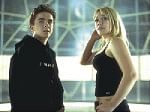 Last
August, the multi-talented Duff crossed over to other platforms, making
her singing debut with the single "I Can't Wait" on the
"Lizzie McGuire" soundtrack from Walt Disney Records. The
song quickly catapulted up the charts on Radio Disney and the album
was certified Gold by the R.I.A.A. this December. She followed her
successful debut with the release of her own Christmas-themed album,
"Santa Claus Lane," by Walt Disney Records. On the album,
Hilary duets with R&B/pop recording artist Christina Milian and
with hip-hop artist Lil' Romeo. In addition, she was chosen to perform
"The Tiki Tiki Room" on the upcoming Disneymania album.
She is currently recording a new album, which will be released in
the fall of 2003.
Last
August, the multi-talented Duff crossed over to other platforms, making
her singing debut with the single "I Can't Wait" on the
"Lizzie McGuire" soundtrack from Walt Disney Records. The
song quickly catapulted up the charts on Radio Disney and the album
was certified Gold by the R.I.A.A. this December. She followed her
successful debut with the release of her own Christmas-themed album,
"Santa Claus Lane," by Walt Disney Records. On the album,
Hilary duets with R&B/pop recording artist Christina Milian and
with hip-hop artist Lil' Romeo. In addition, she was chosen to perform
"The Tiki Tiki Room" on the upcoming Disneymania album.
She is currently recording a new album, which will be released in
the fall of 2003.
Duff's
enormous popularity was further proven with a nomination for Favorite
Television Actress for Nickelodeon's "15th Annual Kids' Choice
Awards," and she accepted the award for "Lizzie McGuire,"
which was voted Favorite Television Series.
Duff
made her stage debut at age six with BalletMet Columbus and its touring
company of "The Nutcracker." Her subsequent role in a television
commercial spurred her longing to act and she soon amassed several
television and film credits.
On
television, she was featured in the miniseries "True Women"
with Dana Delaney and Rachel Leigh Cook, in "Soul Collector"
which earned her a "Young Artist Award" for Best Supporting
Actress, and in a guest-starring role on "Chicago Hope."
She had theatrical roles in "Playing by Heart" with Sean
Connery, Dennis Quaid and Gena Rowlands; as the friendly ghost's best
friend, Wendy, in the successful video release "Casper Meets
Wendy;" and in the Cannes Film Festival favorite "Human
Nature" with Tim Robbins.
Born
September 28, 1987, Duff splits her time between homes in Houston
and Los Angeles with her parents, sister and two dogs. She enjoys
swimming, tumbling and rollerblading. Duff has served on the Advisory
Board of the Audrey Hepburn Child Benefit Fund and the Celebrity Council
of Kids with a Cause.
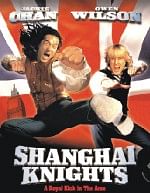 Review
by Gokhra
Review
by Gokhra
JACKIE Chan's last movie, The Tuxedo, was rather lacklustre.
His forte of wacky stunts was way below his usual standard. Everything
was a "seen before" stunt in a loosely plotted movie. Okay
so the plot is really not his fault so he comes back with a bang to
wow his fans with with Shanghai Knights.
Jackie Chan and Owen Wilson(was his nose always so
broken?) return in this sequel to Shanghai Noon released in 2000.
Buddy movies especially where the couple is completely ill-matched
seem to do well in bringing in the money. The first movie had the
duo pair up in the Wild West. This time they move to Victorian London.
It's been a couple of years since Roy O'Bannon (Wilson)
is an incompetent outlaw who has difficulty holding onto his gun once
drawn from the holster. The Shanghai Kid (Chan), or Chon Wang as he's
better known, is sort of a jack of all trades with a specialty in
getting out of weird situations. In the sequel it has been a couple
of yaers since their foray in te west. Chon Wang has brought justice
to Nevada and with the money they made Roy went off to New York to
'invest' their cash. Yes, the apostrophies mean that Roy is upto no
good as usual.
Chon has stayed behind ad has become Sheriff of a
small frontier town. Of course, nothing stays calm longer than two
seconds in the filmworld. Chon receives news that his father has been
murdered and the priceless Imperial Seal stolen from the Forbidden
City in China. Like I said he's a jack of all trades because he manages
to track the killer cum thief to London. Roy and the Shanghai Kid
start off to recover the Seal and avenge a death. Sounds like a good
storyline for a game.
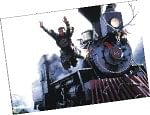 What's
a Jackie Chan movie withput crazy stunts and corny jokes? You get
more then your 15 takas worth of laughs ( yes, yes its all about the
pirated CD and blah blah). The stunts and fights are amazing especially
a revolving door sequence.
What's
a Jackie Chan movie withput crazy stunts and corny jokes? You get
more then your 15 takas worth of laughs ( yes, yes its all about the
pirated CD and blah blah). The stunts and fights are amazing especially
a revolving door sequence.
Wilson with his surprised expression and nasal voice
does his best to meet Chans level of comic genius. And he's pretty
damn good at it. Aiden Gillen plays the steretypicallly villainous
Lord Rathbone with the strong Bristish accent. New characters include
Fann Wong as Chan's little sister who kicks and punches as wildly
as her bro. Other stereotypes inlcude runins with Arthur Conan Doyle,
the typical streetkids decribed by Dickens and also Jack The Ripper.
The
movie offer s a ton of laughs and is well worth the time spent.
Vertical Horizon
IT all started
at a Georgetown undergrad party in 1991. Keith Kane was strumming
an acoustic guitar and asked fellow student and guitar player, Matt
Scannell, to join him. The chemistry between Matt and Keith was evident
and soon after, Keith invited Matt to perform with him at his weekly
gig at a local pub. Taking their name from two words that Kane thought
reflected the music of an acoustic duo, Vertical Horizon was born.
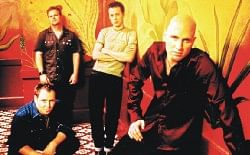 Kane
and Scannell graduated from Georgetown in 1992 and decided that they
would try their hands at a career in music. At the end of a summer
spent gigging on Cape Cod, they went into a recording studio at Matt's
old high school and recorded the songs that would become their debut
album.
Kane
and Scannell graduated from Georgetown in 1992 and decided that they
would try their hands at a career in music. At the end of a summer
spent gigging on Cape Cod, they went into a recording studio at Matt's
old high school and recorded the songs that would become their debut
album.
"There and
Back Again" (1992) saw the duo performing their original songs
on acoustic guitars with tight vocal harmonies, a testament to their
live performances. After completing the record, Kane and Scannell
returned to the DC area where they had already built a devoted following.
There, they hooked up with Jackopierce, a duo from Texas performing
similar music, and were invited to join them on the road. Thus began
the band's touring career with performances along the East coast.
In between trips, the duo spent time in the recording studio and out
of those sessions their second album was born.
"Running
On Ice" (1995) showed an expanded sound with the addition of
a rhythm section on many of the tracks. The album was produced by
John Alagia Doug Derryberry and Carter Beauford from Dave Matthews
Band lent his hand on percussion. The band continued touring and expanded
their fan base by playing with such acts as Shawn Colvin and the Allman
Brothers.
While the band
was touring for "ROI," Ed Toth was working for Borders in
Chestnut Hill, MA. Matt's mom was in the store one day looking for
a Vertical Horizon CD and Ed's boss assisted her. As repayment, the
band invited him to its show in Boston that night. Ed went along and
was very impressed with the band's performance. After the show, he
learned that they were looking for a new drummer. That week, he sent
in a tape and secured an audition. The word is, he blew them away!
In September of
1996, the group performed two shows at Ziggy's in Winston Salem, North
Carolina. These shows, which the band recorded, became the group's
next release. "Live Stages" (1997) captured the band's energetic
performance and introduced their hard rocking electric guitar style.
While touring in support of "Live Stages", the band found
itself in need of a new bass player. Sean Hurley was the first to
audition. He clicked with the band both musically and personally,
and before long, was the newest member of Vertical Horizon.
In late 1997 Vertical
Horizon signed a deal with RCA. They went into the studio in 1998
and began working on their major label debut. "Everything You
Want" (1999) continued the edgier, electric sound the band had
begun exploring in their live shows and featured some of their best
songs to date. The certified double platinum album yielded four singles,
"We Are," " Everything You Want," "You're
a God," and "Best I Ever Had." The song " Everything
You Want" was the most played song on Top 40 radio in the US
for the year 2000 and reached #1 on the Billboard Hot 100 chart. In
addition, it remained at the #1 position on Billboard's Adult Top
40 chart for 16 weeks.
It won two Radio
Music Awards and three Billboard Music Awards. The band also won a
Billboard Music Video Award for Best New Artist Modern Rock Video
for "You're a God."
The
band toured in support of "EYW" for two years playing with
the likes of Third Eye Blind, Dave Matthews Band and Barenaked Ladies.
They also had their first European tour, performing in England, France,
Germany, Holland and Switzerland. After taking a break at the end
of 2001, the band returned to the studio and completed its second
album. "Go" is their latest release and possibly the best
so far.
Game Review
X2:
The Threat
Requirements:
128 MB RAM, 4X CD-ROM, 32 MB VRAM, 800 MB disk spaceX2
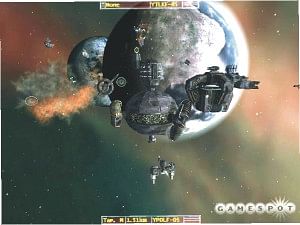 Space
simulations have done so poorly commercially over the past five years
that the genre has almost completely vanished. The trend began when
large publishers EA and LucasArts abandoned their respective Wing
Commander and Star Wars space sim franchises, and it accelerated when
even acclaimed titles, like FreeSpace 2, were unable to attract a
significant commercial market. During the past year, Microsoft released
Freelancer, which a hybrid action space sim with a storied and protracted
development. Aside from this offering, the genre has essentially been
handed over to small, mostly European, developers. X2: The Threat
is the latest space sim to be developed by a small European developer,
and like its recent peers, it's an extremely ambitious but not very
accessible game. It starts very slowly and has a steep learning curve,
but if you're patient enough to stick with it, you'll probably find
that X2 is a diamond in the rough.
Space
simulations have done so poorly commercially over the past five years
that the genre has almost completely vanished. The trend began when
large publishers EA and LucasArts abandoned their respective Wing
Commander and Star Wars space sim franchises, and it accelerated when
even acclaimed titles, like FreeSpace 2, were unable to attract a
significant commercial market. During the past year, Microsoft released
Freelancer, which a hybrid action space sim with a storied and protracted
development. Aside from this offering, the genre has essentially been
handed over to small, mostly European, developers. X2: The Threat
is the latest space sim to be developed by a small European developer,
and like its recent peers, it's an extremely ambitious but not very
accessible game. It starts very slowly and has a steep learning curve,
but if you're patient enough to stick with it, you'll probably find
that X2 is a diamond in the rough.
The scope of X2
is quite immense. Like Privateer or Elite, it's an open-ended space
simulation that gives you the freedom to trade goods, hunt pirates,
loot transports, mine asteroids, escort dignitaries, or just freely
explore an expansive gaming universe. X2 is even more ambitious than
any of those games, since it's also a respectable strategy offering
that allows you to build factories, control capital ships, and ultimately
assemble a fleet to dominate territory and influence economic markets.
It's also set in a relatively dynamic universe that is controlled
by six different races who are all threatened by an ominous newcomer.
As you develop your own economic empire and military force, you have
to learn how to effectively manage and defend your dispersed assets.
Even more impressively, just about everything works as intended, so,
as a result, X2 is one of the most involved space simulations ever.
The spaceflight
engine is also a bit clunky. Unlike the Independence War games, the
physics system doesn't meaningfully incorporate inertia, so you don't
get much sense of motion. Even worse, the controls are finicky, thus
making it difficult to aim precisely. That's less of an encumbrance
than you'd expect, since success in combat is far less dependent upon
twitch skills than it is upon having the right shields and weaponry.
Combat AI is rudimentary, as computer-controlled ships seem to almost
turn randomly in search of opponents, and collisions are extremely
frequent. The engine feels unrefined, and the battles are simplistic,
especially when compared to mission-based space sims like Freespace
2. So, to enjoy X2 you have to truly appreciate its economic and strategic
aspects
There are also
rewarding role-playing elements in X2. You can personalize your empire
by importing your own picture or logo to use for your pilot's photo
or to paste on your vessels. As you successfully deliver goods and
fight off enemies, you'll frequently be awarded gratifying titles
and standing with various factions. Increasing your reputation will
earn you access to additional missions, and it will also increase
the likelihood that you'll become a target of fortune hunters or vengeance
seekers. There are also dozens of ship upgrades to acquire, ranging
from more powerful weapons and engine upgrades to equipment that will
give you the ability to mine or collect organic samples. Since you
can also buy or steal new ships, you're constantly improving or upgrading
your fleet--or trying to accumulate the resources to do so. Additionally,
since you're consistently getting accolades or tangible benefits for
achievements, gameplay is addictive.
The graphics are
colorful and detailed and represent a huge improvement over those
in the original X: Beyond the Frontier. In keeping with the "throw
in the kitchen sink" design of the rest of X2, there's support
for shadows, bump mapping, and antialiasing, though you'll need a
high-powered system with a top-of-the-line graphics card to run the
game with all the graphical bells and whistles at full blast.
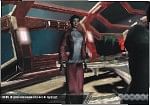 As
you'd expect with a game as complex as X2, there's a steep learning
curve to overcome in order to appreciate all of the game's features.
There really are an incredible number of things to do aside from just
exploring and taking in the sights. There are simple missions that
you can pick up at bases, but the game really comes into its own as
a free-form simulation. You can hire ships, set up supply routes between
factories for a fleet of transports, maintain spy satellites, blockade
enemy installations to manipulate the dynamic economy, space walk
to assume control of a different vessel, or just carve a swath of
destruction. The interface is, unfortunately, correspondingly complex,
with lots of hotkeys and menus to navigate. Each ship has a system
of monitors that you can activate to maintain situational awareness
from different perspectives. You're not limited to controlling your
own ship, since you can give orders to ships and installations in
other locations remotely, and you can use the monitors to assume direct
control of supporting ships. There's usually more than one way to
take an action, and often, the easiest way isn't the most apparent.
Unfortunately, the truly awful system of tutorials isn't much assistance
since it doesn't actually identify the requisite key commands. Collectively,
the poor tutorials and complexity of the game require you to invest
a couple of hours before you'll feel comfortable with the interface.
Once you've mastered it, however, it works quite well.
As
you'd expect with a game as complex as X2, there's a steep learning
curve to overcome in order to appreciate all of the game's features.
There really are an incredible number of things to do aside from just
exploring and taking in the sights. There are simple missions that
you can pick up at bases, but the game really comes into its own as
a free-form simulation. You can hire ships, set up supply routes between
factories for a fleet of transports, maintain spy satellites, blockade
enemy installations to manipulate the dynamic economy, space walk
to assume control of a different vessel, or just carve a swath of
destruction. The interface is, unfortunately, correspondingly complex,
with lots of hotkeys and menus to navigate. Each ship has a system
of monitors that you can activate to maintain situational awareness
from different perspectives. You're not limited to controlling your
own ship, since you can give orders to ships and installations in
other locations remotely, and you can use the monitors to assume direct
control of supporting ships. There's usually more than one way to
take an action, and often, the easiest way isn't the most apparent.
Unfortunately, the truly awful system of tutorials isn't much assistance
since it doesn't actually identify the requisite key commands. Collectively,
the poor tutorials and complexity of the game require you to invest
a couple of hours before you'll feel comfortable with the interface.
Once you've mastered it, however, it works quite well.
While there are
a few shortcuts you can take, it will generally take many hours before
you can start building an economic empire or take the helm of the
more formidable vessels. Unfortunately, it's easy to be turned off
by X2 because of the initial time commitment required to become adept
with its controls and because of the unrefined engine and unsophisticated
combat. However, X2 does offer some highly satisfying gameplay--if
you're willing to stick with it. It's not a game that has any reasonable
prospect of revitalizing the space sim genre, since it's from a small
developer and isn't particularly accessible, but it's a game that
highlights why the genre was once much more popular.
